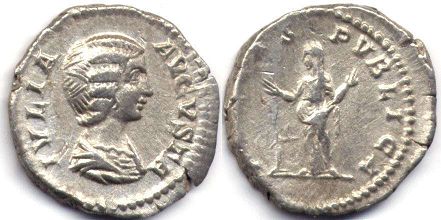Coins of Julia Domna - catalog with values
Roman Empress (170?-211)
Wife of Septimius Severus.

IVLIA AVGUSTA
PIETAS PVBLICA
denarius 199-207
silver
Rome
18 mm.
Draped bust right / Julia Augusta
Pietas standing left, holds hands over the altar / Pietas of the people
Coin value ~ US$70-90
Costs of Julia Domna coins in this catalog approximate and indicated specifically for the coin shown in the picture.
I do not buy or sell coins - this is just a catalog.
See other coins of Imperial Rome.

